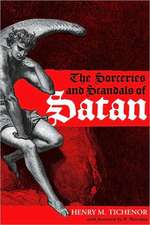The Tea Party Explained: From Crisis to Crusade: Ideas Explained
Autor Yuri Maltsev, Roman Skaskiwen Limba Engleză Paperback – 7 oct 2013
Preț: 131.75 lei
Nou
Puncte Express: 198
Preț estimativ în valută:
25.22€ • 26.32$ • 21.14£
25.22€ • 26.32$ • 21.14£
Carte disponibilă
Livrare economică 20 februarie-06 martie
Preluare comenzi: 021 569.72.76
Specificații
ISBN-13: 9780812698312
ISBN-10: 0812698312
Pagini: 206
Dimensiuni: 150 x 226 x 15 mm
Greutate: 0.3 kg
Ediția:New.
Editura: Open Court Publishing Company
Seria Ideas Explained
ISBN-10: 0812698312
Pagini: 206
Dimensiuni: 150 x 226 x 15 mm
Greutate: 0.3 kg
Ediția:New.
Editura: Open Court Publishing Company
Seria Ideas Explained
Cuprins
Contents
Preface
Acknowledgments
1. The Tea Party’s Two Beginnings
2. Economic Backlash
3. Divisions: God and War
4. Organizations and Individuals
5. Obamacare Outrage
6. The Tenth Amendment Movement
7. Tea Party Demographics
8. The Tea Party in the 2010 Elections
9. The Tea Party in the 2012 Elections
10. The Tea Party and Occupy Wall Street
11. A Future for the Tea Party
Notes
Index
Preface
Acknowledgments
1. The Tea Party’s Two Beginnings
2. Economic Backlash
3. Divisions: God and War
4. Organizations and Individuals
5. Obamacare Outrage
6. The Tenth Amendment Movement
7. Tea Party Demographics
8. The Tea Party in the 2010 Elections
9. The Tea Party in the 2012 Elections
10. The Tea Party and Occupy Wall Street
11. A Future for the Tea Party
Notes
Index
Notă biografică
Yuri Maltsev is a professor of economics at Carthage College, Wisconsin. He lives in Pleasant Prairie, WI. Roman Skaskiw is a writer, entrepreneur, and former Infantry Officer in the US Army. He lives in Mt. Airy, NC.
Descriere
The Tea Party first attracted the media spotlight with Rick Santelli’s televised rant against the government’s bailout of mortgage borrowers on February 19, 2009, which instantly went viral as a video. As the authors document, however, “tea parties” associated with the Ron Paul movement had already been gathering momentum for more than a year. Beginning as a protest against government spending sprees, the Tea Party’s sudden fame forced it to define itself on many issues where the membership was seriously divided. Fiscal conservatives, who were usually liberal on social issues, battled social conservatives in an uneasy series of maneuvers that continues unresolved and is described in the book. The Tea Party Explained, written by two Tea Party activists, gives a well-documented account of the Tea Party, its origins, its evolution, the bitter squabbles over its direction, its amazing successes in 2010, and its electoral rebuff in 2012. Maltsev and Skaskiw analyze its demographics, the many organizations which have tried to represent, appropriate, or infiltrate the movement, and the ideological divisions within.























